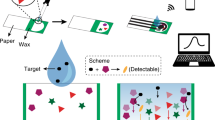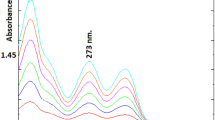Abstract
FOR the paper chromatography of steroids several colour reagents are used, such as 2,4-dinitrophenyl-hydrazine, Zimmermann's reagent, phosphomolybdic acid, antimony trichloride, etc. Their common defect is that the reagent gives some colour with the paper itself, and so the contrast between spot and paper is too small. We have found that acid aniline phthalate in alcoholic solution—the reagent Partridge used for tracing sugars1—is suitable for the indication of steroids as well. On the white background the steroids show as yellow, orange or brown spots.
This is a preview of subscription content, access via your institution
Access options
Subscribe to this journal
Receive 51 print issues and online access
$199.00 per year
only $3.90 per issue
Buy this article
- Purchase on Springer Link
- Instant access to full article PDF
Prices may be subject to local taxes which are calculated during checkout
Similar content being viewed by others
References
Nature, 164, 443 (1949).
Author information
Authors and Affiliations
Rights and permissions
About this article
Cite this article
BODÁNSZKY, A., KOLLONITSCH, J. Colour Reagent for Paper Chromatography of Steroids. Nature 175, 729–730 (1955). https://doi.org/10.1038/175729a0
Issue Date:
DOI: https://doi.org/10.1038/175729a0
This article is cited by
-
Microbial transformations of steroids
Folia Microbiologica (1966)
-
Contribution on the diagnosis ofStaphylococcus aureus rosenbach
Folia Microbiologica (1964)
-
Oscillopolarographic detection of transformation of steroids by actinomycetes
Folia Microbiologica (1963)
-
Microbial transformation of steroid
Folia Microbiologica (1963)
-
Microbial transformation of steroids
Folia Microbiologica (1963)
Comments
By submitting a comment you agree to abide by our Terms and Community Guidelines. If you find something abusive or that does not comply with our terms or guidelines please flag it as inappropriate.



